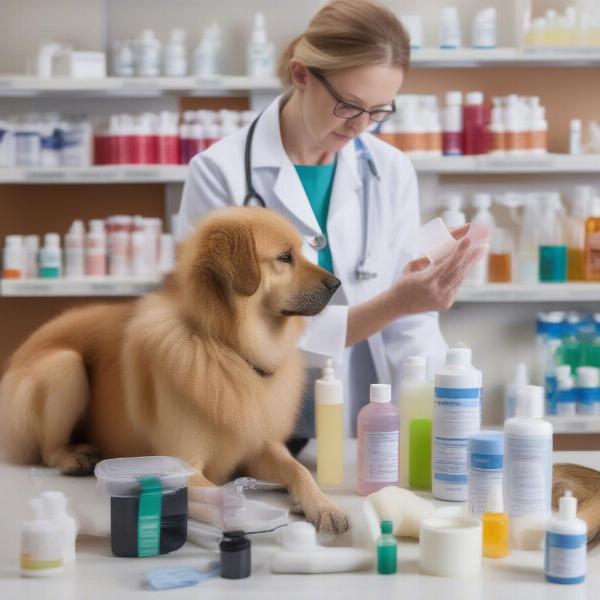Antiseptic for dogs plays a vital role in preventing infections and promoting healing in minor wounds. Understanding how to choose and use the right antiseptic is crucial for every dog owner. This guide provides comprehensive information on various types of antiseptics suitable for dogs, their applications, and important safety precautions.
Choosing the Right Antiseptic for Your Dog
Selecting an appropriate antiseptic for your dog can be overwhelming given the variety of products available. Always consult with your veterinarian before using any new antiseptic on your dog, especially if they have pre-existing health conditions. They can recommend the most suitable option based on your dog’s individual needs. Look for antiseptics specifically formulated for dogs, avoiding those designed for human use, which may contain harmful ingredients. Common antiseptic options for dogs include chlorhexidine, povidone-iodine, and hydrogen peroxide.
 Choosing the Right Antiseptic for Your Dog
Choosing the Right Antiseptic for Your Dog
Chlorhexidine for Dogs
Chlorhexidine is a broad-spectrum antiseptic effective against various bacteria, fungi, and viruses. It’s available in different formulations, including solutions, sprays, and wipes. Chlorhexidine is generally well-tolerated by dogs and is a popular choice for cleaning wounds, surgical sites, and skin infections.
Povidone-Iodine for Dogs
Povidone-iodine is another broad-spectrum antiseptic commonly used for dogs. It’s available as a solution and is effective against a wide range of microorganisms. However, it can stain fur and may cause irritation in some dogs, so it’s important to use it as directed by your veterinarian.
Hydrogen Peroxide for Dogs
Hydrogen peroxide is a mild antiseptic that can be used to clean superficial wounds in dogs. It’s important to use a diluted solution (3%) and avoid using it on deep or puncture wounds, as it can damage the surrounding tissue. neosporin spray for dogs can also be used in some instances.
How to Apply Antiseptic on Dogs
Before applying any antiseptic, gently clean the wound with lukewarm water and pat it dry with a clean cloth. Apply the antiseptic as directed by your veterinarian or the product label. Avoid applying excessive pressure or rubbing the wound vigorously. For solutions, you can use a cotton ball or gauze pad to apply the antiseptic. For sprays, hold the bottle a few inches away from the wound and spray evenly.
Safety Precautions when using Antiseptic for Dogs
- Always consult your vet before using a new antiseptic.
- Choose antiseptics formulated for canine use.
- Follow the product label instructions carefully.
- Never use human antiseptics on dogs.
- Monitor your dog for any adverse reactions.
- Store antiseptics out of reach of children and pets.
- If you are unsure about anything, always seek professional advice.
When to Seek Veterinary Care
While antiseptics are helpful for minor wounds, certain situations warrant immediate veterinary attention. These include:
- Deep or puncture wounds
- Wounds with excessive bleeding
- Wounds showing signs of infection (redness, swelling, pus)
- Bites from other animals
- Wounds that don’t heal within a reasonable time frame
“Early intervention is crucial for optimal wound healing in dogs,” says Dr. Emily Carter, DVM. “Don’t hesitate to contact your veterinarian if you’re concerned about your dog’s wound, even if it appears minor.”
“Proper wound care is essential for preventing infections and promoting healing,” adds Dr. Sarah Miller, DVM. “Using the right antiseptic plays a significant role in this process.” Consider hylyt shampoo for dogs for skin health.
Conclusion
Antiseptic for dogs is a crucial component of responsible pet ownership. Understanding how to choose and use antiseptics safely and effectively can help you provide the best possible care for your canine companion. Always consult with your veterinarian for guidance on appropriate wound care practices and the best antiseptic solutions for your dog.
FAQ
- What is the best antiseptic for dog wounds? The best antiseptic depends on the specific wound and your dog’s individual needs. Consult your veterinarian for personalized recommendations.
- Can I use human antiseptic on my dog? No, human antiseptics may contain ingredients harmful to dogs. Always use products specifically formulated for canine use.
- How often should I apply antiseptic to my dog’s wound? Follow your veterinarian’s instructions or the product label guidelines for frequency of application.
- What should I do if my dog licks the antiseptic? Try to prevent your dog from licking the antiseptic. If they do, contact your veterinarian immediately.
- When should I take my dog to the vet for a wound? Seek veterinary care for deep wounds, excessive bleeding, signs of infection, animal bites, or wounds that don’t heal.
Related Articles
ILM Dog is a leading international online resource dedicated to providing expert advice on all aspects of dog care, from breed selection and health to training and nutrition. We are passionate about helping dog owners worldwide provide the best possible care for their furry companions. Our website offers valuable insights into various dog breeds, health and wellness tips, training guides, nutritional advice, and recommendations for bandages for dogs and other essential products. To learn more about our services and how we can help you become a more informed and confident dog owner, contact us at [email protected] or call us at +44 20-3965-8624. Visit ILM Dog for more information.